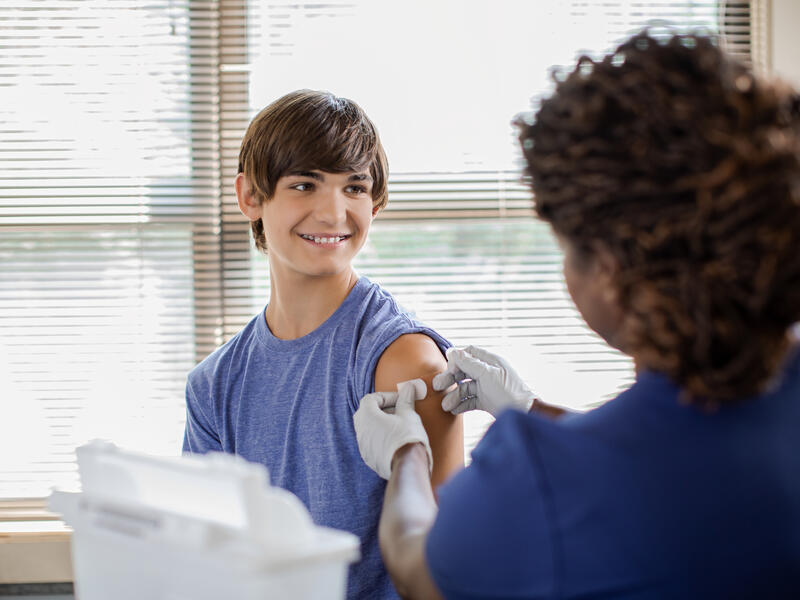Reports of whooping cough (also known as pertussis) are rising in the United States based on information from the Centers for Disease Control and Prevention.
Preliminary data from the CDC show that about five times as many cases have been reported through the first nine months of 2024 compared to the same time in 2023.
The rise in occurrences has happened in part because people who believe they’re protected against whooping cough are learning that older vaccines wane in effectiveness. Many adults lose track of the last time they were vaccinated or ignore the recommendation to have a booster shot every 10 years.
The result? Outbreaks of the highly contagious bacterial infection have become more common.
“If you have been exposed to whooping cough and you think you might be infected, the best place to seek care is your primary care doctor office or an acute care clinic,” said Margo Free, M.D., a pediatric infectious disease specialist at Sanford Children’s Specialty Clinic in Sioux Falls, South Dakota. “Fortunately, most people who get whooping cough do not need to be admitted to the hospital.”
Establish a vaccination calendar
Key points in avoiding the worst of whooping cough:
- Babies should receive a series of shots with a combination vaccine for diphtheria, tetanus and pertussis starting at age 2 months.
- In general, adults should get a booster shot every 10 years.
- Pregnant people should get one dose of the vaccine during every pregnancy to protect baby.
- Talk to your doctor about the right schedule for you.
“Children should receive their pertussis vaccines at 2 months, 4 months, 6 months, 15 months, and 4 years, then again at 11 years,” Dr. Free said. “If you find that your child is not up to date with the pertussis vaccine, you can call his or her PCP office to schedule a vaccine visit.”
Need your vaccinations? Find a Sanford location
How do I know it’s whooping cough?
Because it usually starts with symptoms that mimic a cold, recognizing whooping cough can be difficult until it advances. It’s most dangerous for babies, requiring hospitalization for about half of children diagnosed before their first birthday.
Early symptoms last one to two weeks and may include:
- Runny nose
- Low-grade fever
- Mild, occasional cough
- Apnea (pauses in breathing) in babies
Symptoms progress to:
- Coughing fits followed by a “whoop” sound
- Vomiting during or after coughing fits
- Exhaustion
“Infection with whooping cough starts with congestion and runny nose about a week after exposure to someone with whooping cough,” Dr. Free said. “If you develop a runny nose and congestion after exposure to someone who has whooping cough, then you should be tested. Antibiotics for whooping cough are most effective when given early in the course of illness before the whooping cough starts.”
If you may have been exposed to whooping cough
Babies under one year of age, pregnant women and those with serious health problems who suspect they have been exposed to whooping cough should call their doctor even if they do not have any symptoms, according to Dr. Free.
“We may give preventative antibiotics to individuals who are at high risk of developing severe infection,” she said. “For all individuals, vaccines are our best preventative tool. It’s very important to make sure that you and your children and you are up to date with the pertussis vaccines. If you’re not, call your PCP clinic to schedule a vaccine visit.”
Risk increases over time
Risk of catching whooping cough is 13 times higher among unvaccinated children and twice as likely among kids who are behind on their shots, compared with fully vaccinated kids, according to a report published in the medical journal Pediatrics.
Among vaccinated children, time since their last DTap dose makes a difference. Up to age 7, kids have a five times higher whooping cough risk when they’re three years out from their last shot, compared to the year immediately after vaccination, the study authors said.
Kids between 7 and 11 have double the risk if they are more than six years away from their last shot, compared with less than three years after, the findings showed.
Learn more
- Pneumonia vaccine: Do you need it?
- What you need to know about the flu and the flu vaccine
- Vaccines are for adults, too
…
Posted In Children's, Family Medicine, Healthy Living, Immunizations, Internal Medicine, Sioux Falls
